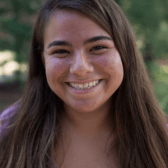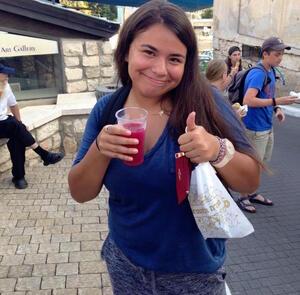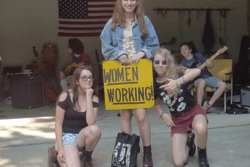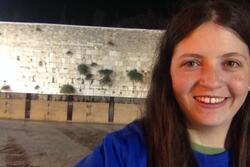A Pluralistic Girl in a Non-Pluralistic City
Not many high school students are able to say that they had a spiritual junior year—usually that year is described with a different “s” word. However, my pluralistic Jewish high school, Gann Academy, gives their junior class an opportunity to spend the first trimester in Israel. We spent half of the trip in Hod Hasharon, where we attended classes and lived like regular Israeli students. We spent the rest of the time on journeys to different locations throughout Israel.
As a vocal feminist, you might expect me to get upset at various sites in Israel, such as the Kotel, because women are not treated equally to men. On the contrary, I tend to forgive these characteristics that go against my personal values, and instead embrace the spiritual and Jewish aspects to which I can connect. However, I broke this trend on a Shabbat trip to Tsfat, one of the holiest cities in the country with one of the most observant populations.
The journey to Tsfat was one that I was looking forward to for a long time. I remembered a feeling of awe and intense spirituality from my visits there in the past. The whole city has accents of blue all around, making you feel like you are in the heights of heaven as well as in the depths of the ocean at the same time.
Once we settled into our hostel on Friday afternoon, one of our teachers told us our plan for Shabbat; the boys were heading to a Kabbalat Shabbat service, while the girls were going to visit a woman who was going to tell us about life as a religious Jew in Tsfat. Now, as much as I love a good autobiography, I love a good Kabbalat Shabbat even more. Sadly though, I wasn’t being given that option because of my gender. And this time, I stood my ground.
I confronted my teacher about the unfair situation. I told him that I couldn’t believe that there was no option for me, a young Jewish girl seeking a meaningful experience, to pray. His response was a curt: “Well, you didn’t bring a long skirt so it doesn’t matter anyway.” As if being excluded from services for being a girl wasn’t bad enough, now I got to be told that I couldn’t go because I wasn’t dressed “appropriately.” Fantastic.
As frustrated as I was, I decided I didn’t want to go into Shabbat with a negative attitude, so I ignored my irritation and just went with the flow. The conversation with the woman from Tsfat was actually pretty interesting, but after a classic youth hostel dinner of potatoes, chicken, and rice, the events of the night took an unforgivable turn. Our teachers had planned a fun surprise for us, with the boys and girls going their separate ways again; the boys to a mikvah, a Jewish spiritual purifying bath, and the girls to a room in the hostel to play truth or dare.
Yes, you read that right. That really was a fully thought out plan.
I was in utter disbelief. For the second time in one night, an opportunity for Jewish education and spiritual growth was being taken away from me because of my gender. I was aware of the gender disparity in Jewish practice, but because I had always been in pluralistic or egalitarian settings, I had never experienced them as offensively as I did that night. That was the thing that frustrated me most; I expected so much more from my pluralistic school. For example, during the regular school year, there are dozens of options for all different types of minyans, including a women’s minyan where a bunch of girls come together to talk about feminist issues, an art minyan, and a meditation minyan. These are in addition to the regular mechitza, Reform, and partnership minyans. My school clearly knows how to create an environment with options to make anyone comfortable, but in Tsfat, I was left option-less. I just wish they acknowledged how difficult it is to be a woman, especially a non-observant woman, in a place like Tsfat, instead of just shoving the gender issues under the rug.
Although this was not the first time I felt the need to stick up for my Jewish and feminist identities, it is definitely an event that I will never forget. Even though my voice didn’t cause an immediate change, just the fact that I did something made me feel better. The severity with which I felt excluded from something that I have always taken for granted, has opened my eyes in an extremely personal way to the inequality in my religion. This memory of this disparity is what makes me want to share my opinion and defend my values, so that other girls don’t have to feel excluded. I hope that my writing can empower others to stand up for their morals in a similar fashion.
This piece was written as part of JWA’s Rising Voices Fellowship.







